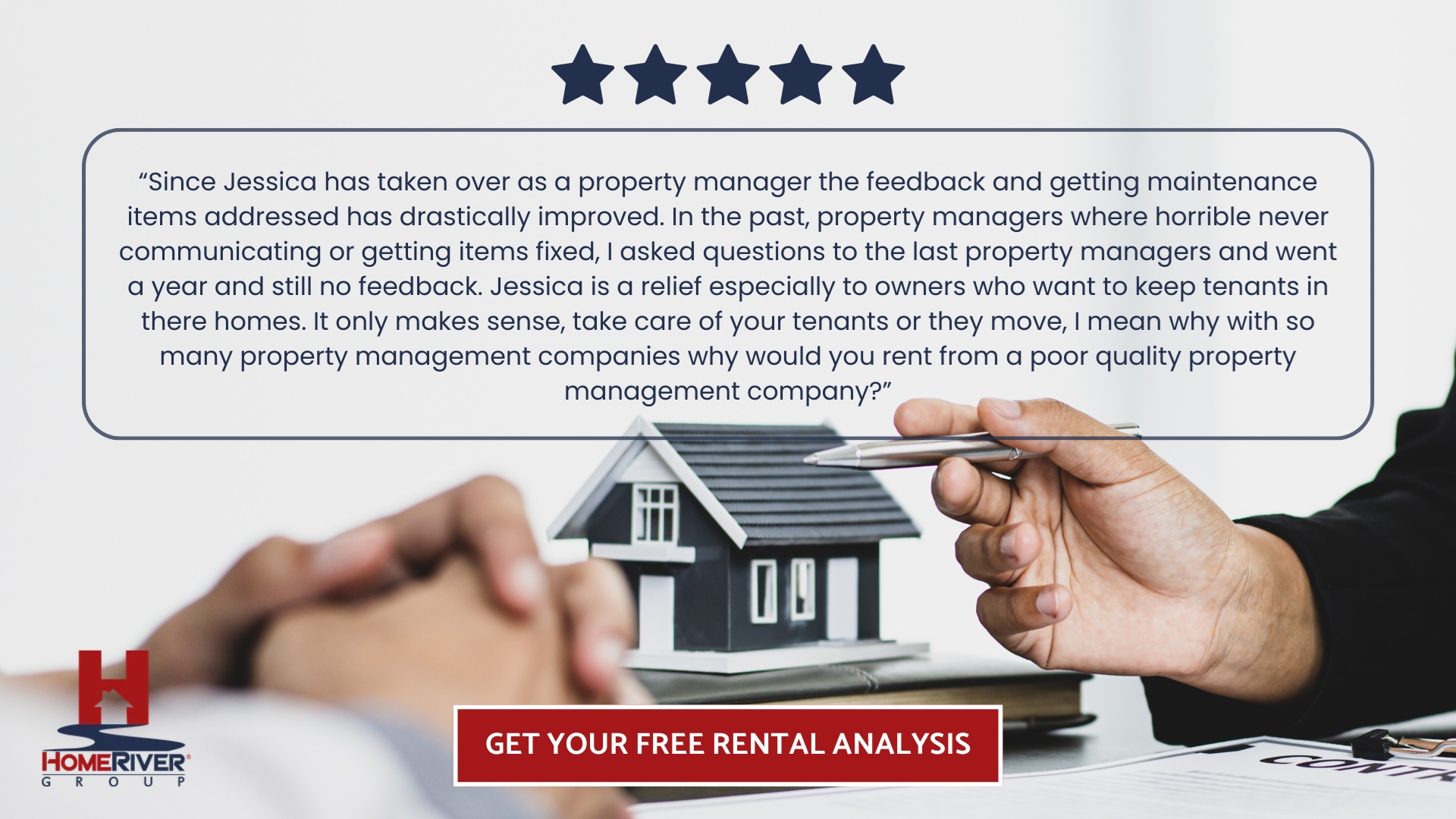
At HomeRiver Group, we redefine property management by pairing nationwide resources with unmatched local expertise. From legal compliance to tenant relations, we handle the heavy lifting so property owners can focus on growth. Our proven systems, experienced professionals, and transparent communication deliver results you can count on—whether managing a single unit or an entire portfolio. With HomeRiver, you're not just meeting standards but setting them.
Breaking a lease is never a decision to take lightly, especially when the legal and financial implications run deep. Understanding your rights and responsibilities is critical if you're a landlord navigating tenant violations or a renter facing unexpected lease termination. If you've been asking, "Can a landlord break a lease?" It's important to know the valid scenarios, risks, and legal protections that apply to both parties before taking action.
In this blog, we will explore the legal scenarios in which a landlord may terminate a lease early, the rights tenants hold during this process, and the key differences between lawful lease termination and eviction procedures.
Legal Reasons A Landlord Can Break A Lease
Landlords are generally held to strict legal standards regarding breaking a lease. Unlike tenants, who often have multiple avenues for ending a lease early, landlords must have clear, lawful reasons.
Here are some common scenarios where the law may permit a landlord to terminate a lease agreement before its stated end date:
One of the most common legal reasons a landlord can break a lease is if a tenant violates the terms of the agreement. It could include:
Nonpayment of rent
Repeated late payment of rent
Unauthorized occupants or subletting
Keeping prohibited pets
Causing significant damage to the property
Engaging in illegal activities on the premises
In these cases, landlords are typically required to provide written notice and, depending on state and local laws, may need to allow tenants to remedy the violation before the lease is terminated.
In some jurisdictions, landlords may break a lease if they intend to move into the rental property themselves or if a close family member plans to move in. This option isn’t available everywhere and often comes with strict regulations, including providing advance written notice—sometimes as much as 90 days—before ending the lease for this reason.
If a landlord plans to make the property uninhabitable or demolish the building, they may be legally able to break the lease. Local laws usually dictate what qualifies as a “substantial” renovation and what notice must be given. Regular maintenance or cosmetic upgrades aren’t grounds for breaking a lease early.
A lease may be terminated if authorities condemn the property, declaring it unsafe for habitation. In some cases, if the property is sold, new owners may have specific rights to terminate or renegotiate leases. However, existing leases must be honored in many areas until they expire.
Tenant Rights When A Landlord Breaks A Lease
When a landlord decides to break a lease, it’s a significant disruption regulated by state and local laws. As a tenant, you have rights to protect your housing stability and financial well-being.
Lease Agreements Are Legally Binding Contracts
First, understand that a lease is a binding contract. If a landlord attempts to terminate it early without a legally valid reason—such as primary renovation needs, property sales under specific clauses, or lease violations on your part—they could violate the agreement. This is especially true when breaking a rent-to-own contract, which may carry additional legal obligations tied to purchase terms and equity considerations.
Notice Requirements And Compensation Eligibility
Many states require landlords to give written notice within a set timeframe, ranging from 30 to 90 days, depending on local statutes. You may be entitled to additional time or compensation if proper notice isn't provided.
Challenging Unlawful Termination
You might also have the right to contest the termination. If you believe the landlord’s grounds for breaking the lease are invalid, you can challenge the decision through mediation or court. In some jurisdictions, you may also have the right to request relocation assistance or reimbursement for moving expenses, especially if the lease is broken for reasons outside your control.
Refund Of Prepaid Rent And Deposits
Additionally, landlords are typically required to return any prepaid rent or security deposits, assuming no damages beyond normal wear and tear. Be sure to document the property’s condition before you leave and keep records of all communications with your landlord for future reference.
Local Laws Offer Additional Protections
Know your local tenant laws, as they can offer further protections, such as restrictions on lease termination during winter months or for families with school-aged children. If you’re unsure about your rights, consulting a legal expert or a tenant advocacy organization can help you navigate the process confidently.
Illegal Reasons For Landlord Lease Termination
It’s important to understand that although landlords hold certain rights regarding lease agreements, these rights are not unlimited. Clear legal boundaries are established to protect renters from unfair treatment. Landlords cannot terminate a lease for just any reason, especially when those reasons cross legal or ethical lines.
Here are some of the most common illegal grounds for lease termination:
Retaliation: If you’ve filed a complaint about unsafe conditions or exercised your legal rights as a tenant, a landlord cannot end your lease simply to retaliate. Laws in many states explicitly prevent landlords from terminating a lease in response to legitimate grievances or participation in tenant unions.
Discrimination: The Fair Housing Act and similar state laws prohibit landlords from terminating leases based on race, color, religion, sex, national origin, familial status, or disability. Any attempt to remove a tenant for reasons related to these protected categories is not just illegal—it’s staunchly enforced.
Refusal to Waive Legal Rights: Sometimes, landlords try to push tenants into giving up rights guaranteed by local or federal law, such as the right to privacy or to a habitable living environment. Ending a lease because a tenant holds firm on these protections is strictly outlawed.
Reporting Code Violations: Tenants can report housing code violations or unsafe conditions to local authorities. Terminating a lease in response to these reports is considered retaliatory and is prohibited by law.
Steps To Take If Your Landlord Ends Your Lease Early
Receiving notice that your lease is ending unexpectedly can be stressful and confusing. However, you can navigate the situation more confidently by acting quickly and understanding your rights.
Here’s what you should do if your landlord seeks to terminate your lease early:
Review Your Lease Agreement: Start by reading your lease contract thoroughly. Pay special attention to clauses about early termination, notice periods, and acceptable reasons for ending the lease. Understanding what you agreed to upfront is the foundation for your next steps. Also, ensure the landlord has met the notice required when not renewing a lease, as failure to do so could invalidate the termination attempt.
Ask for Written Notice: If your landlord plans to end your lease early, they must provide written notice. This document should specify the reason for the termination and the move-out date. Keep all correspondence for your records.
Understand Local & State Laws: Rental laws differ from one state or city to the next. Consult your local tenant board or government website to check what legal protections apply to your situation. In some places, landlords face strict requirements, like notice periods or compensation for early termination.
Request an Explanation: If the landlord did not provide a clear reason for ending your lease, request one in writing. Valid reasons may include property sale, owner move-in, or significant renovations. If the reason doesn’t match what’s allowed under your lease or by law, you may have grounds to contest the termination.
Negotiate or Seek Mediation: Sometimes, communication opens the door for compromise. You can sometimes negotiate more time to move out, financial compensation, or even rescind the termination. Mediation services are often available and can help both parties reach an agreement outside court.
Document Everything: Keep detailed records of all communications, notices, and agreements related to the lease termination. A paper trail can significantly strengthen your case in a dispute.
Explore Your Next Steps: If you believe the landlord is breaking the lease unlawfully, consider contacting a local tenant advocacy group or seeking legal advice. You may have options to challenge the termination, remain in your unit, or be entitled to compensation.
Approaching an early lease termination with clarity and preparation will put you in the best position to protect your rights as a renter.
Compensation For Early Lease Termination
Compensation often becomes a central concern when a landlord ends a lease agreement before its expiration. In most states, landlords cannot simply evict tenants or terminate leases without cause or proper notice. Understanding the rules around canceling a lease after signing is also crucial, as doing so without valid legal grounds can trigger financial liabilities or tenant claims.
Legal Justification Is Required For Early Termination
If a lease must end early—whether due to sale of the property, planned renovations, or other legal reasons—landlords are typically required to follow strict guidelines regarding compensation.
Reimbursement For Prepaid Rent And Deposits
Tenants may be entitled to reimbursement for prepaid rent or security deposits. Without documented property damage or unpaid rent, these funds must generally be returned under state or local regulations.
Compensation For Relocation Expenses
Additionally, some tenants may be eligible for financial compensation to help offset relocation expenses or the inconvenience of moving on short notice, mainly if the tenant's fault didn’t cause the termination.
Voluntary Lease Buyout Agreements
When tenants are asked to vacate before their lease ends, landlords may propose a buyout agreement. This often includes an offer of money in exchange for the tenant’s agreement to leave the property by a certain date. The specifics of such arrangements depend on the lease terms and local laws, yet transparency and written documentation are always crucial.
Importance Of Documentation And Legal Compliance
Consulting the lease contract and understanding local tenant protection statutes can help clarify both parties' rights and obligations regarding compensation. Ultimately, while landlords can sometimes break a lease, they must do so by all applicable compensation requirements. This fosters trust and protects both landlord and tenant from potential legal disputes down the road.
Final Thoughts
Understanding whether a landlord can break a lease is essential for protecting your rights as a renter or a property owner. Lease agreements create a binding commitment for both parties. While there are specific circumstances where a landlord may legally terminate a lease, those situations are typically limited by local laws and well-defined lease terms.
At HomeRiver Group, we believe in transparency and professionalism, giving you the detailed insights you need to make informed decisions. Whether you’re a tenant defending your right to a secure home or an owner ensuring your investment is protected, clear communication and familiarity with the law are crucial. If you face a potential lease termination—no matter which side of the agreement you’re on—don’t hesitate to seek thorough advice or professional guidance.
Read also:
Rental Property Passive Income: How To Build Wealth Over Time
Rental Property Expenses List: What Every Landlord Should Track
Airbnb vs Rental Property: Which Investment Strategy Is Better?
Frequently Asked Questions About Can A Landlord Break A Lease
Can a landlord legally break a lease?
Yes, a landlord can terminate a lease under specific circumstances. However, the reasons must comply with state and local laws. Lease agreements are binding contracts, so a landlord can’t simply end a lease early without legitimate grounds and proper notice, unless both parties mutually agree.
What are valid reasons for a landlord to terminate a lease?
Valid reasons might include significant lease violations by the tenant (such as non-payment of rent, illegal activities, or causing substantial damage to the property), the need to make extensive property repairs, or, in rare cases, personal or family occupancy where allowed by law. In all cases, proper notice and documentation are essential.
What are a tenant's rights when a landlord breaks a lease?
Tenants have the right to receive prior written notice and the opportunity to remedy certain issues, depending on state statutes and the lease terms. If the termination doesn’t follow legal procedures, tenants may have the right to contest the action or seek damages.
Does a tenant have the right to dispute a lease termination?
Absolutely. Tenants can formally dispute a lease break if they believe the landlord’s reasons are invalid or the process was not handled according to law. Common paths include seeking mediation, filing a complaint with local housing authorities, or taking legal action.
What constitutes a breach of lease by a landlord?
Landlord breaches can include entering the property without notice, failing to maintain habitable living conditions, or terminating the lease without proper legal grounds or notice. Such actions can entitle tenants to remedies or even lease termination without penalty.
Is a landlord responsible for relocation costs if they break a lease?
Depending on jurisdiction and the reason for termination, landlords may be required to cover tenants’ relocation costs, particularly in “no-fault” evictions such as owner move-ins or substantial renovations. Always confirm with your local housing authority or a legal advisor.











